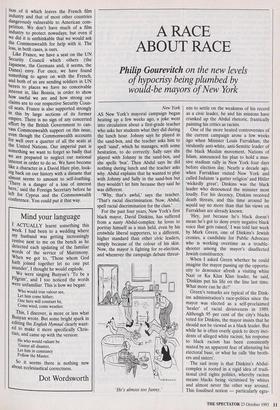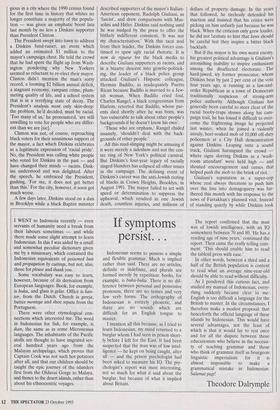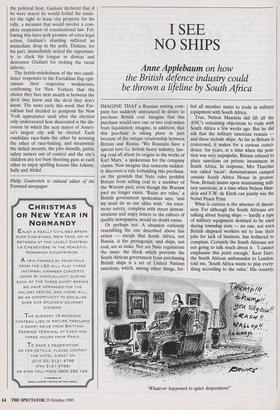A RACE ABOUT RACE
Philip Gourevitch on the new levels of hypocrisy being plumbed by would-be mayors of New York
New York AS New York's mayoral campaign began heating up a few weeks ago, a joke went into circulation about a first-grade teacher who asks her students what they did during the lunch hour. Johnny says he played in the sand-box, and the teacher asks him to spell 'sand', which he manages, with some hesitation, to do correctly. Sally says she played with Johnny in the sand-box, and she spells 'box'. Then Abdul says he did nothing during lunch and the teacher asks why. Abdul explains that he wanted to play with Johnny and Sally in the sand-box but they wouldn't let him because they said he was different.
`Why, that's awful,' says the teacher. `That's racial discrimination. Now, Abdul, spell racial discrimination for the class.' For the past four years, New York's first black mayor, David Dinkins, has suffered from a nasty Abdul-complex: he loves to portray himself as a man held, even by his erstwhile liberal supporters, to a different, higher standard than other civic leaders, simply because of the colour of his skin. Now, the mayor is fighting for re-election, and whenever the campaign debate threat- `He's almost too funny.' ens to settle on the weakness of his record as a civic leader, he and his minions have cranked up the Abdul rhetoric, frantically painting his critics as racists.
One of the more heated controversies of the current campaign arose a few weeks ago when Minister Louis Farrakhan, the virulently anti-white, anti-Semitic leader of the black Muslim movement, Nations of Islam, announced his plan to hold a mas- sive stadium rally in New York four days before election day. Nearly a decade ago, when Farrakhan visited New York and called Judaism 'a gutter religion' and Hitler `wickedly great', Dinkins was the black leader who denounced the minister most loudly. For his decency, Dinkins received death threats, and this time around he would say no more than that his views on Farrakhan are already known.
`Hey, just because he's black doesn't mean he's got to deny every negative black voice that gets raised,' I was told last week by Mark Green, one of Dinkins's Jewish cronies, a candidate for Public Advocate who is working overtime as a trouble- shooter among the mayor's disaffected Jewish constituency.
When I asked Green whether he could imagine the mayor passing up the opportu- nity to denounce afresh a visiting white Nazi or Ku Klux Klan leader, he said, `Dinkins put his life on the line last time. What more can he do?'
Green's remarks are typical of the Dink- ins administration's race-politics since the mayor was elected as a self-proclaimed 'healer' of racial divisiveness in 1989. Although 95 per cent of the city's blacks voted for Dinkins, the mayor insists that he should not be viewed as a black leader. But while he is often overly quick to decry inci- dents of alleged white racism, his response to black racism has been consistently muted by an apparent fear of alienating his electoral base, or what he calls 'the broth- ers and sisters'.
The sad irony is that Dinkins's Abdul- complex is rooted in a rigid idea of tradi- tional civil rights politics, whereby racism means blacks being victimised by whites and almost never the other way around. This fossilised notion — particularly egre- gious in a city where the 1990 census found for the first time in history that whites no longer constitute a majority of the popula- tion — was given an emphatic boost late last month by no less a Dinkins supporter than President Clinton.
The President swept into town to address a Dinkins fund-raiser, an event which added an estimated $1 million to the mayor's campaign chest. He told the crowd that he had spent the flight up from Wash- ington pondering why New Yorkers seemed so reluctant to re-elect their mayor. Clinton didn't mention the man's sorry record, a looming $2 billion annual deficit, a stagnant economy, rampant crime, plum- meting quality of life, and a school system that is in a terrifying state of decay. The President's analysis went only skin-deep: the problem, he'd decided, must be racial. 'Too many of us,' he pronounced, 'are still unwilling to vote for people who are differ- ent than we are [sic]: Clinton was not, of course, reproaching black voters for their unanimous support of the mayor, a fact which Dinkins celebrates as a legitimate expression of 'racial pride'. No, the President was calling white people who voted for Dinkins in the past — and have changed their minds — racists. Dink- ins understood and was delighted. After the speech, he embraced the President, gushing, 'For me, it does not get better than this.' For the city, however, it soon got much worse.
A few days later, Dinkins stood on a dais in Brooklyn while a black Baptist minister
described supporters of the mayor's Italian- American opponent, Rudolph Giuliani, as `fascist', and drew comparisons with Mus- solini and Hitler. Dinkins said nothing until he was nudged by the press to offer the blithely indifferent comment, 'It was not my characterisation.' With this tacit nod from their leader, the Dinkins forces con- tinued to spew ugly racial rhetoric. It is now de rigueur for the black media to describe Giuliani supporters as racists, and in a bizarre descent into genetic-politick- ing, the leader of a black police group attacked Giuliani's Hispanic colleague, Herman Badillo, as inadequately Puerto Rican because Badillo is married to a Jew- ish woman. When Badillo cried foul, Charles Rangel, a black congressman from Harlem, retorted that Badillo, whose par- ents died shortly after he was born, was 'too vulnerable to talk about other people's backgrounds if he doesn't know his own'.
'Those who are orphans,' Rangel chided insanely, 'shouldn't deal with the back- grounds of other people.'
All this mud-slinging might be amusing if it were merely a sideshow and not the cen- tre ring of New York's political carnival. But Dinkins's four-year legacy of racially tinged blunders has eclipsed all other issues in the campaign. The defining event of Dinkins's career was the anti-Jewish rioting of blacks in Crown Heights, Brooklyn, in August 1991. The mayor failed to act with speed or determination to suppress the upheaval, which resulted in one Jewish death, countless injuries, and millions of dollars of property damage. In the years that followed, he tirelessly defended his inaction and insisted that his critics were picking on him unfairly just because he was black. When the criticism only grew louder, he did not hesitate to hint that Jews should be careful lest they inspire a bitter black backlash.
But if the mayor is his own worst enemy, his greatest political advantage is Giuliani's astonishing inability to inspire enthusiasm among the disaffected electorate. The hard-jawed, icy former prosecutor, whom Dinkins beat by just 2 per cent of the vote four years ago, is running as a law-and- order Republican in a town of Democrats traditionally suspicious of strong-arm police authority. Although Giuliani has generally been careful to steer clear of the racial booby-traps strewn along his cam- paign trail, he has found it difficult to over- come the frightening image he projected last winter, when he joined a violently unruly, beer-soaked mob of 10,000 off-duty policemen at a City Hall demonstration against Dinkins. Leaping onto a sound truck, Giuliani harangued the crowd where signs slurring Dinkins as a 'wash- room attendant' were held high — and shouted encouragement and curses that helped push the mob to the brink of riot.
Giuliani's reputation as a super-cop whose zeal always threatens to push him over the line into demagoguery was fur- thered this month with his response to the news of Farrakhan's planned visit. Instead of standing quietly by while Dinkins took the political heat, Giuliani declared that if he were mayor he would forbid the minis- ter the right to lease city property for his rally, a measure that would involve a com- plete suspension of constitutional law. Fol- lowing this knee-jerk promise of extra-legal action, Giuliani's standing suffered an immediate drop in the polls. Dinkins, for his part, immediately seized the opportuni- ty to cluck his tongue in dismay and denounce Giuliani for stoking the racial inferno.
The feeble-mindedness of the two candi- dates' responses to the Farrakhan flap epit- omises their respective weaknesses, confirming for New Yorkers that the choice they face next month is between the devil they know and the devil they don't know. The news early this week that Far- rakhan had decided to postpone his New York appearance until after the election only underscored how desiccated is the dis- course by which the next mayor of Ameri- ca's largest city will be elected. Each candidate race-baits the other by accusing the other of race-baiting, and meanwhile the deficit mounts, the jobs dwindle, public safety teeters out of control and the city's children are too busy shooting guns at each other to enjoy spelling lessons like Johnny, Sally and Abdul.
Philip Gourevitch is cultural editor of the Forward newspaper.




































































 Previous page
Previous page